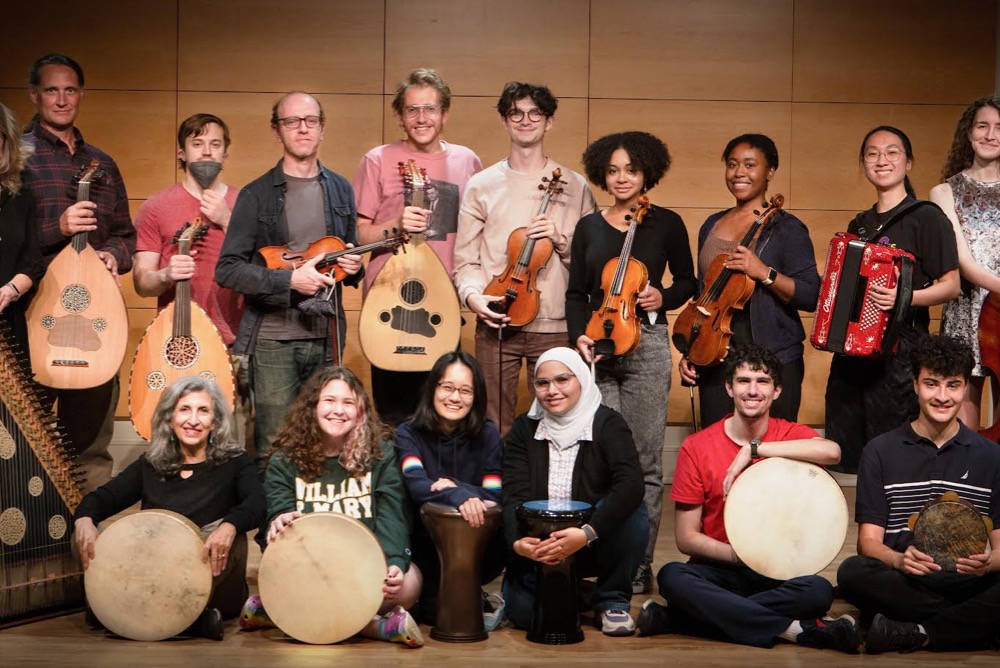Reves Center for International Studies Events
[PAST EVENT] The Asian Centennial presents “Inside Arab Music at Ewell Hall with Johnny Farraj”
Access & Features
- Open to the public
- Registration/RSVP

Johnny Farraj will visit Worlds of Music (MUSC 241/ANTH 241) at 9:30-10:50 to discuss aspects of his co-authored book Inside Arabic Music and to demonstrate (musically) some of its core principles. For info: Anne Rasmussen.
Johnny Farraj is a Lebanese-born musician and software engineer of Palestinian descent. His main instrument is the riqq; he also plays the 'ud and sings. Farraj is the creator of MaqamWorld, the leading Internet reference on Arabic music theory, and is a frequent Arabic music blogger, teacher and performer, as well as a lifelong listener.
His co-author, Sami Abu Shumays is a Palestinian-American musician, arts administrator, and independent scholar, who traveled to Cairo and Aleppo to immerse himself in Arabic Music. After returning to the U.S., he began performing and teaching, founded Zikrayat ensemble, and developed the pedagogical website Maqam lessons. He is currently Deputy Director of Flushing Town Hall, an arts presenter in Queens, NY.
About the Book:
Over its fifteen-century history, Arabic music has had a global resonance that followed the Islamic empire itself, across Europe to the west and into India to the east. By the mid-20th century, the music spread further through radio and musical cinema, and the West's fascination with Raqs Sharqi - or "bellydance." Yet Arabic music remains widely misunderstood, in part because of the maqam - the music's unique and complex system of melodic modes. From deep inside the tradition, renowned performers Johnny Farraj and Sami Abu Shumays guide readers through maqam, and introduce the instruments, artists, rhythms, and forms of Arabic music. Their discussion of maqam and improvisation taps into linguistics, network theory, cognition, and music analysis to explore the relationships among music, culture, and human community. Drawing theory directly from practice, Inside Arabic music de-mystifies the music, and presents a comprehensive guide for beginner and expert alike.
Inside Arabic Music will be accessible to students and non-specialists, but it also contains details in the later chapters that will engage music scholars interested in the more complex aspects of the maqam system. The book will be particularly appealing to those who have studied Arab music previously and want to deepen their knowledge of its theory and practice. -- Nicholas Mangialardi, Journal of American Folklore
Coauthors Farraj and Abu Shumays have written both an engaging guide for general readers and a valuable resource for musicians and scholars. ... Inside Arabic Music's greatest strength lies in its generous presentation of Arab music as an accessible, living art that today's musicians can learn and that general readers can understand and appreciate. -- Kay Hardy Campbell, AramcoWorld
The scope of content that might have produced two volumes is densely packed within one highly readable book, making Inside Arabic Music an indispensable vade mecum for the English-speaking scholar, educator, musician, or enthusiast. -- Journal of Folklore Research
Inside Arabic Music is a landmark piece of literature for countless students of Arabic music such as myself, and I cannot recommend this work highly enough to those who wish to become more immersed in Arabic music. I have no doubt that Inside Arabic Music will become a cornerstone of education for lovers and performers of Arabic music, and it deserves a prized place in every enthusiast's collection. -- Washington Report on Middle Eastern Affairs
It is the greatest and most comprehensive source of information regarding Arabic music currently out there...Farraj and Abu Shumays, while focusing on exploring Arabic music, have actually shed light on Arabic culture as a whole. It is a culture based on community and social interaction. It is one which greatly appreciates and cultivates art, especially music as it is a means for social gatherings to occur. While Arabic culture may seem overwhelming to those outside of it, its spontaneous nature comes from a sense of inclusion and enjoyment. -- Naim Mousa, Mondoweiss
Inside Arab Music [is] an essential starting point for anyone hoping to deepen their understanding of any music from the region. [...] Johnny Farraj and Sami Abu Shumays thoughtfully provide plentiful suggestions of recordings to help your ears understand concepts that your brain may struggle with. -- Songlines
Contact
[[akrasm]]
This Event Appears On
- W&M Featured Events
- Arts & Sciences Events
- Global Studies Events
- International Relations Events
- Reves Center for International Studies Events
- Asian & Middle Eastern Studies Events
- William & Mary Crim Dell Association
- Hulon Willis Association (HWA)
- LatinX Alumni of William & Mary (LatinX)
- Asian & Pacific Islander American Studies
- Religious Studies
- Asian, Pacific Islander and Middle Eastern Alumni
- Asian Centennial
